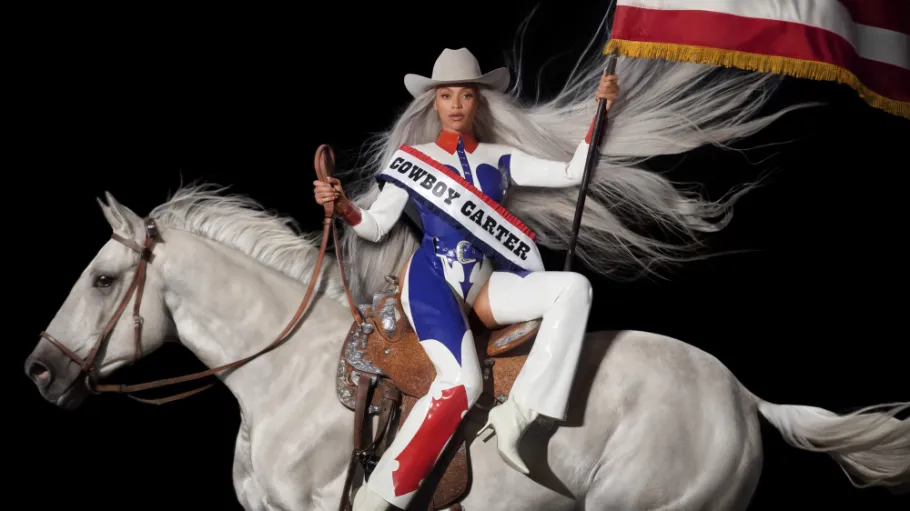Last week, on March 29, Beyoncé Giselle Knowles-Carter released her 8th studio album, “ACT II Cowboy Carter”. Days before the release, the artist posted a caption on Instagram providing insight into the development of the album, saying it was five years in the making, and “born” out of an experience where she hadn’t felt welcomed. This was in reference to her 2016 performance with the Dixie Chicks at the 2016 Country Music Awards, which she stated inspired her to take “a deeper dive into the history of Country music and (study) our rich musical archive.”
The amount of effort that went into this album is hard to ignore, but the details hidden in plain sight provide even more perspective into Beyonce’s motivations. The album itself is a perfect loop, which the artist alluded to in her Instagram caption before the release of “Cowboy Carter II,” saying, “start from the beginning and never stop.” While the album cover is relatively unsuspecting, with Beyonce featured on top of a horse waving an American flag, the breed she’s of horse she’s riding is known for changing color from black to white as it ages, making a statement about the ever-shifting demographics of country music.
The first track, “American Requiem” references the catholic requiem or mass for the souls of the deceased. Co-written by John Batiste, the song is an interpretation of Buffalo Springfield’s anti-war protest anthem from 1966, “For What It’s Worth”. The following song features four up-and-coming black female country musicians, Tanner Adell, Brittney Spencer, Tiera Kennedy and Reyna Roberts. The song is a cover of “Blackbird” originally written by Paul McCartney directed towards black women in response to the Civil Rights movement in the 60’s and 70’s.
The third song on the album, “16 Carriages” represents Beyonce’s youth and how she had to leave her family to start a career, the first few verses saying “Had to leave my home at an early age… All my tender problems, had to leave behind…It’s been umpteen summers and I’m not in my bed… On the back of the bus and a bunk with the band.” The fourth and fifth tracks continue the story of the artist’s life and inspirations, “Protector” and “My Rose” being lullabies dedicated to her children, Rumi and Sir Carter
The sixth track, “Smoke Hour” is an interlude from Willie Nelson that ends with the words, “If you don’t wanna go, go find yourself a jukebox…” This introduces the next track, “Texas Hold ‘Em” which was released in February along with “16 Carriages.” Although it quickly reached#1 on Billboard 100, it’s faced significant criticism for not being “real” country music, even having been banned from various country radio stations across the U.S. This hit is followed by the love song “Bodyguard,” a reference to Whitney Houston’s movie, “The Bodyguard.”
In 2022, Dolly Parton was interviewed by Trevor Noah on The Daily Show and discussed her interest in seeing her song, “Jolene” covered by Beyonce. “Dolly P” is the ninth track on the album, featuring Dolly Parton speaking to the artist, introducing “Jolene” as the next song. Beyonce altered some lyrics from the hit, “warning” Jolene instead of “begging” her, and referring to the narrator as “a Creole banjee b*tch from Louisiane.” Considering Beyonce’s mother is from Louisiana, it’s suspected that this cover may be a commentary on the relationship between the artist’s parents.
The following song, “Daughter” showcases Beyonce’s vocal talent and range, in performing part of the Italian opera “Caro Mio Ben.” The next track, “Spaghetti” references the “Spaghetti Western” genre, or “western” films that took place in Italy instead of the Western United States and were criticized at the time for being “inauthentic” and “cheaply made” despite eventually gaining significant fame and recognition.
The rest of the 27-track album is just as packed with history and insight, featuring more from Dolly Parton and Willie Nelson, as well as Post Malone and Miley Cyrus– both of whom are known for their tendency to switch between country and pop. The artist had previously told fans “This ain’t a country album. This is a “Beyonce” album,” which she proved upon its release, with inspiration from opera, Brazilian funk, country, folk, hyperpop, rap, and soul, “Cowboy Carter II” further solidifies Beyonce’s status as an artist not limited by expectations or genre.









